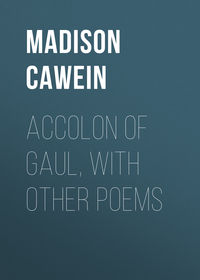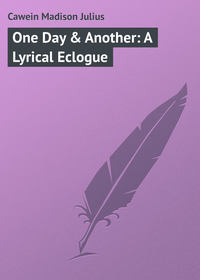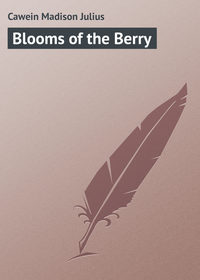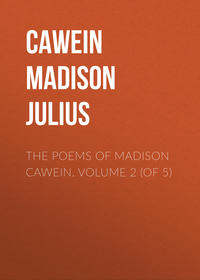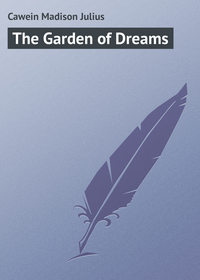Полная версия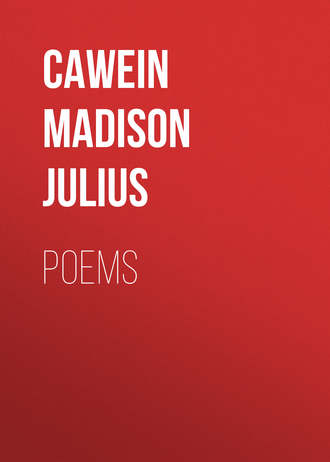
Купить и скачать
Добавить В библиотеку
Poems
Автор:
Жанр:
Год написания книги: 2018
Тэги:
Настройки чтения
Размер шрифта
Высота строк
Поля
THE WIND OF SPRING
The wind that breathes of columbines And celandines that crowd the rocks; That shakes the balsam of the pines With laughter from his airy locks, Stops at my city door and knocks. He calls me far a-forest, where The twin-leaf and the blood-root bloom; And, circled by the amber air, Life sits with beauty and perfume Weaving the new web of her loom. He calls me where the waters run Through fronding ferns where wades the hern; And, sparkling in the equal sun, Song leans above her brimming urn, And dreams the dreams that love shall learn. The wind has summoned, and I go: To read God's meaning in each line The wildflowers write; and, walking slow, God's purpose, of which song is sign,— The wind's great, gusty hand in mine.THE CATBIRD
I The tufted gold of the sassafras, And the gold of the spicewood-bush, Bewilder the ways of the forest pass, And brighten the underbrush: The white-starred drifts of the wild-plum tree, And the haw with its pearly plumes, And the redbud, misted rosily, Dazzle the woodland glooms.II And I hear the song of the catbird wake I' the boughs o' the gnarled wild-crab, Or there where the snows of the dogwood shake, That the silvery sunbeams stab: And it seems to me that a magic lies In the crystal sweet of its notes, That a myriad blossoms open their eyes As its strain above them floats.III I see the bluebell's blue unclose, And the trillium's stainless white; The birdfoot-violet's purple and rose, And the poppy, golden-bright! And I see the eyes of the bluet wink, And the heads of the white-hearts nod; And the baby mouths of the woodland-pink And sorrel salute the sod.IV And this, meseems, does the catbird say, As the blossoms crowd i' the sun:— "Up, up! and out! oh, out and away! Up, up! and out, each one! Sweethearts! sweethearts! oh, sweet, sweet, sweet! Come listen and hark to me! The Spring, the Spring, with her fragrant feet, Is passing this way!—Oh, hark to the beat Of her beelike heart!—Oh, sweet, sweet, sweet! Come! open your eyes and see! See, see, see!"A WOODLAND GRAVE
White moons may come, white moons may go— She sleeps where early blossoms blow; Knows nothing of the leafy June, That leans above her night and noon, Crowned now with sunbeam, now with moon, Watching her roses grow. The downy moth at twilight comes And flutters round their honeyed blooms: Long, lazy clouds, like ivory, That isle the blue lagoons of sky, Redden to molten gold and dye With flame the pine-deep glooms. Dew, dripping from wet fern and leaf; The wind, that shakes the violet's sheaf; The slender sound of water lone, That makes a harp-string of some stone, And now a wood bird's glimmering moan, Seem whisperings there of grief. Her garden, where the lilacs grew, Where, on old walls, old roses blew, Head-heavy with their mellow musk, Where, when the beetle's drone was husk, She lingered in the dying dusk, No more shall know that knew. Her orchard,—where the Spring and she Stood listening to each bird and bee,— That, from its fragrant firmament, Snowed blossoms on her as she went, (A blossom with their blossoms blent) No more her face shall see. White moons may come, white moons may go— She sleeps where early blossoms blow: Around her headstone many a seed Shall sow itself; and brier and weed Shall grow to hide it from men's heed, And none will care or know.SUNSET DREAMS
The moth and beetle wing about The garden ways of other days; Above the hills, a fiery shout Of gold, the day dies slowly out, Like some wild blast a huntsman blows: And o'er the hills my Fancy goes, Following the sunset's golden call Unto a vine-hung garden wall, Where she awaits me in the gloom, Between the lily and the rose, With arms and lips of warm perfume, The dream of Love my Fancy knows. The glowworm and the firefly glow Among the ways of bygone days; A golden shaft shot from a bow Of silver, star and moon swing low Above the hills where twilight lies: And o'er the hills my Longing flies, Following the star's far-arrowed gold, Unto a gate where, as of old, She waits amid the rose and rue, With star-bright hair and night-dark eyes, The dream, to whom my heart is true, My dream of Love that never dies.THE OLD BYWAY
Its rotting fence one scarcely sees Through sumac and wild blackberries, Thick elder and the bramble-rose, Big ox-eyed daisies where the bees Hang droning in repose. The little lizards lie all day Gray on its rocks of lichen-gray; And, insect-Ariels of the sun, The butterflies make bright its way, Its path where chipmunks run. A lyric there the redbird lifts, While, twittering, the swallow drifts 'Neath wandering clouds of sleepy cream,— In which the wind makes azure rifts,— O'er dells where wood-doves dream. The brown grasshoppers rasp and bound Mid weeds and briers that hedge it round; And in its grass-grown ruts,—where stirs The harmless snake,—mole-crickets sound Their faery dulcimers. At evening, when the sad west turns To lonely night a cheek that burns, The tree-toads in the wild-plum sing; And ghosts of long-dead flowers and ferns The winds wake, whispering."BELOW THE SUNSET'S RANGE OF ROSE"
Below the sunset's range of rose, Below the heaven's deepening blue, Down woodways where the balsam blows, And milkweed tufts hang, gray with dew, A Jersey heifer stops and lows— The cows come home by one, by two. There is no star yet: but the smell Of hay and pennyroyal mix With herb aromas of the dell, Where the root-hidden cricket clicks: Among the ironweeds a bell Clangs near the rail-fenced clover-ricks. She waits upon the slope beside The windlassed well the plum trees shade, The well curb that the goose-plums hide; Her light hand on the bucket laid, Unbonneted she waits, glad-eyed, Her gown as simple as her braid. She sees fawn-colored backs among The sumacs now; a tossing horn Its clashing bell of copper rung: Long shadows lean upon the corn, And slow the day dies, scarlet stung, The cloud in it a rosy thorn. Below the pleasant moon, that tips The tree tops of the hillside, fly The flitting bats; the twilight slips, In firefly spangles, twinkling by, Through which he comes: Their happy lips Meet—and one star leaps in the sky. He takes her bucket, and they speak Of married hopes while in the grass The plum drops glowing as her cheek; The patient cows look back or pass: And in the west one golden streak Burns as if God gazed through a glass.MUSIC OF SUMMER
I Thou sit'st among the sunny silences Of terraced hills and woodland galleries, Thou utterance of all calm melodies, Thou lutanist of Earth's most affluent lute,— Where no false note intrudes To mar the silent music,—branch and root,— Charming the fields ripe, orchards and deep woods, To song similitudes Of flower and seed and fruit.II Oft have I seen thee, in some sensuous air, Bewitch the broad wheat-acres everywhere To imitated gold of thy deep hair: The peach, by thy red lips' delicious trouble, Blown into gradual dyes Of crimson; and beheld thy magic double— Dark-blue with fervid influence of thine eyes— The grapes' rotundities, Bubble by purple bubble.III Deliberate uttered into life intense, Out of thy soul's melodious eloquence Beauty evolves its just preëminence: The lily, from some pensive-smitten chord Drawing significance Of purity, a visible hush stands: starred With splendor, from thy passionate utterance, The rose writes its romance In blushing word on word.IV As star by star Day harps in Evening, The inspiration of all things that sing Is in thy hands and from their touch takes wing: All brooks, all birds,—whom song can never sate,— The leaves, the wind and rain, Green frogs and insects, singing soon and late, Thy sympathies inspire, thy heart's refrain, Whose sounds invigorate With rest life's weary brain.V And as the Night, like some mysterious rune, Its beauty makes emphatic with the moon, Thou lutest us no immaterial tune: But where dim whispers haunt the cane and corn, By thy still strain made strong, Earth's awful avatar,—in whom is born Thy own deep music,—labors all night long With growth, assuring Morn Assumes with onward song.MIDSUMMER
I The mellow smell of hollyhocks And marigolds and pinks and phlox Blends with the homely garden scents Of onions, silvering into rods; Of peppers, scarlet with their pods; And (rose of all the esculents) Of broad plebeian cabbages, Breathing content and corpulent ease.II The buzz of wasp and fly makes hot The spaces of the garden-plot; And from the orchard,—where the fruit Ripens and rounds, or, loosed with heat, Rolls, hornet-clung, before the feet,— One hears the veery's golden flute, That mixes with the sleepy hum Of bees that drowsily go and come.III The podded musk of gourd and vine Embower a gate of roughest pine, That leads into a wood where day Sits, leaning o'er a forest pool, Watching the lilies opening cool, And dragonflies at airy play, While, dim and near, the quietness Rustles and stirs her leafy dress.IV Far-off a cowbell clangs awake The noon who slumbers in the brake: And now a pewee, plaintively, Whistles the day to sleep again: A rain-crow croaks a rune for rain, And from the ripest apple tree A great gold apple thuds, where, slow, The red cock curves his neck to crow.V Hens cluck their broods from place to place, While clinking home, with chain and trace, The cart-horse plods along the road Where afternoon sits with his dreams: Hot fragrance of hay-making streams Above him, and a high-heaped load Goes creaking by and with it, sweet, The aromatic soul of heat.VI "Coo-ee! coo-ee!" the evenfall Cries, and the hills repeat the call: "Coo-ee! coo-ee!" and by the log Labor unharnesses his plow, While to the barn comes cow on cow: "Coo-ee! coo-ee!"—and, with his dog, Barefooted boyhood down the lane "Coo-ees" the cattle home again.THE RAIN-CROW
I Can freckled August,—drowsing warm and blond Beside a wheat-shock in the white-topped mead, In her hot hair the yellow daisies wound,— O bird of rain, lend aught but sleepy heed To thee? when no plumed weed, no feathered seed Blows by her; and no ripple breaks the pond, That gleams like flint within its rim of grasses, Through which the dragonfly forever passes Like splintered diamond.II Drouth weights the trees; and from the farmhouse eaves The locust, pulse-beat of the summer day, Throbs; and the lane, that shambles under leaves Limp with the heat—a league of rutty way— Is lost in dust; and sultry scents of hay Breathe from the panting meadows heaped with sheaves— Now, now, O bird, what hint is there of rain, In thirsty meadow or on burning plain, That thy keen eye perceives?III But thou art right. Thou prophesiest true. For hardly hast thou ceased thy forecasting, When, up the western fierceness of scorched blue, Great water-carrier winds their buckets bring Brimming with freshness. How their dippers ring And flash and rumble! lavishing large dew On corn and forest land, that, streaming wet, Their hilly backs against the downpour set, Like giants, loom in view.IV The butterfly, safe under leaf and flower, Has found a roof, knowing how true thou art; The bumblebee, within the last half-hour, Has ceased to hug the honey to its heart; While in the barnyard, under shed and cart, Brood-hens have housed.—But I, who scorned thy power, Barometer of birds,—like August there,— Beneath a beech, dripping from foot to hair, Like some drenched truant, cower.FIELD AND FOREST CALL
I There is a field, that leans upon two hills, Foamed o'er of flowers and twinkling with clear rills; That in its girdle of wild acres bears The anodyne of rest that cures all cares; Wherein soft wind and sun and sound are blent With fragrance—as in some old instrument Sweet chords;—calm things, that Nature's magic spell Distills from Heaven's azure crucible, And pours on Earth to make the sick mind well. There lies the path, they say— Come away! come away!II There is a forest, lying 'twixt two streams, Sung through of birds and haunted of dim dreams; That in its league-long hand of trunk and leaf Lifts a green wand that charms away all grief; Wrought of quaint silence and the stealth of things, Vague, whispering' touches, gleams and twitterings, Dews and cool shadows—that the mystic soul Of Nature permeates with suave control, And waves o'er Earth to make the sad heart whole. There lies the road, they say— Come away! come away!OLD HOMES
Old homes among the hills! I love their gardens; Their old rock fences, that our day inherits; Their doors, round which the great trees stand like wardens; Their paths, down which the shadows march like spirits; Broad doors and paths that reach bird-haunted gardens. I see them gray among their ancient acres, Severe of front, their gables lichen-sprinkled,— Like gentle-hearted, solitary Quakers, Grave and religious, with kind faces wrinkled,— Serene among their memory-hallowed acres. Their gardens, banked with roses and with lilies— Those sweet aristocrats of all the flowers— Where Springtime mints her gold in daffodillies, And Autumn coins her marigolds in showers, And all the hours are toilless as the lilies. I love their orchards where the gay woodpecker Flits, flashing o'er you, like a wingéd jewel; Their woods, whose floors of moss the squirrels checker With half-hulled nuts; and where, in cool renewal, The wild brooks laugh, and raps the red woodpecker. Old homes! old hearts! Upon my soul forever Their peace and gladness lie like tears and laughter; Like love they touch me, through the years that sever, With simple faith; like friendship, draw me after The dreamy patience that is theirs forever.THE FOREST WAY
I I climbed a forest path and found A dim cave in the dripping ground, Where dwelt the spirit of cool sound, Who wrought with crystal triangles, And hollowed foam of rippled bells, A music of mysterious spells.II Where Sleep her bubble-jewels spilled Of dreams; and Silence twilight-filled Her emerald buckets, star-instilled, With liquid whispers of lost springs, And mossy tread of woodland things, And drip of dew that greenly clings.III Here by those servitors of Sound, Warders of that enchanted ground, My soul and sense were seized and bound, And, in a dungeon deep of trees Entranced, were laid at lazy ease, The charge of woodland mysteries.IV The minions of Prince Drowsihead, The wood-perfumes, with sleepy tread, Tiptoed around my ferny bed: And far away I heard report Of one who dimly rode to Court, The Faery Princess, Eve-Amort.V Her herald winds sang as they passed; And there her beauty stood at last, With wild gold locks, a band held fast, Above blue eyes, as clear as spar; While from a curved and azure jar She poured the white moon and a star.SUNSET AND STORM
Deep with divine tautology, The sunset's mighty mystery Again has traced the scroll-like west With hieroglyphs of burning gold: Forever new, forever old, Its miracle is manifest. Time lays the scroll away. And now Above the hills a giant brow Of cloud Night lifts; and from his arm, Barbaric black, upon the world, With thunder, wind and fire, is hurled His awful argument of storm. What part, O man, is yours in such? Whose awe and wonder are in touch With Nature,—speaking rapture to Your soul,—yet leaving in your reach No human word of thought or speech Commensurate with the thing you view.QUIET LANES
From the lyrical eclogue "One Day and Another" Now rests the season in forgetfulness, Careless in beauty of maturity; The ripened roses round brown temples, she Fulfills completion in a dreamy guess. Now Time grants night the more and day the less: The gray decides; and brown Dim golds and drabs in dulling green express Themselves and redden as the year goes down. Sadder the fields where, thrusting hoary high Their tasseled heads, the Lear-like corn-stocks die, And, Falstaff-like, buff-bellied pumpkins lie.— Deepening with tenderness, Sadder the blue of hills that lounge along The lonesome west; sadder the song Of the wild redbird in the leafage yellow.— Deeper and dreamier, aye! Than woods or waters, leans the languid sky Above lone orchards where the cider press Drips and the russets mellow. Nature grows liberal: from the beechen leaves The beech-nuts' burrs their little purses thrust, Plump with the copper of the nuts that rust; Above the grass the spendthrift spider weaves A web of silver for which dawn designs Thrice twenty rows of pearls: beneath the oak, That rolls old roots in many gnarly lines,— The polished acorns, from their saucers broke, Strew oval agates.—On sonorous pines The far wind organs; but the forest near Is silent; and the blue-white smoke Of burning brush, beyond that field of hay, Hangs like a pillar in the atmosphere: But now it shakes—it breaks, and all the vines And tree tops tremble; see! the wind is here! Billowing and boisterous; and the smiling day Rejoices in its clamor. Earth and sky Resound with glory of its majesty, Impetuous splendor of its rushing by.— But on those heights the woodland dark is still, Expectant of its coming…. Far away Each anxious tree upon each waiting hill Tingles anticipation, as in gray Surmise of rapture. Now the first gusts play, Like laughter low, about their rippling spines; And now the wildwood, one exultant sway, Shouts—and the light at each tumultuous pause, The light that glooms and shines, Seems hands in wild applause. How glows that garden!—Though the white mists keep The vagabonding flowers reminded of Decay that comes to slay in open love, When the full moon hangs cold and night is deep; Unheeding still their cardinal colors leap Gay in the crescent of the blade of death,— Spaced innocents whom he prepares to reap,— Staying his scythe a breath To mark their beauty ere, with one last sweep, He lays them dead and turns away to weep.— Let me admire,— Before the sickle of the coming cold Shall mow them down,—their beauties manifold: How like to spurts of fire That scarlet salvia lifts its blooms, which heap With flame the sunlight. And, as sparkles creep Through charring vellum, up that window's screen The cypress dots with crimson all its green, The haunt of many bees. Cascading dark old porch-built lattices, The nightshade bleeds with berries; drops of blood Hanging in clusters 'mid the blue monk's-hood. There is a garden old, Where bright-hued clumps of zinnias unfold Their formal flowers; where the marigold Lifts a pinched shred of orange sunset caught And elfed in petals; the nasturtium, Deep, pungent-leaved and acrid of perfume, Hangs up a goblin bonnet, pixy-brought From Gnomeland. There, predominant red, And arrogant, the dahlia lifts its head, Beside the balsam's rose-stained horns of honey, Lost in the murmuring, sunny Dry wildness of the weedy flower bed; Where crickets and the weed-bugs, noon and night, Shrill dirges for the flowers that soon shall die, And flowers already dead.— I seem to hear the passing Summer sigh: A voice, that seems to weep,— "Too soon, too soon the Beautiful passes by! And soon, among these bowers Will dripping Autumn mourn with all her flowers"— If I, perchance, might peep Beneath those leaves of podded hollyhocks, That the bland wind with odorous murmurs rocks, I might behold her,—white And weary,—Summer, 'mid her flowers asleep, Her drowsy flowers asleep, The withered poppies knotted in her locks.ONE WHO LOVED NATURE
I He was not learned in any art; But Nature led him by the hand; And spoke her language to his heart So he could hear and understand: He loved her simply as a child; And in his love forgot the heat Of conflict, and sat reconciled In patience of defeat.II Before me now I see him rise— A face, that seventy years had snowed With winter, where the kind blue eyes Like hospitable fires glowed: A small gray man whose heart was large, And big with knowledge learned of need; A heart, the hard world made its targe, That never ceased to bleed.III He knew all Nature. Yea, he knew What virtue lay within each flower, What tonic in the dawn and dew, And in each root what magic power: What in the wild witch-hazel tree Reversed its time of blossoming, And clothed its branches goldenly In fall instead of spring.IV He knew what made the firefly glow And pulse with crystal gold and flame; And whence the bloodroot got its snow, And how the bramble's perfume came: He understood the water's word And grasshopper's and cricket's chirr; And of the music of each bird He was interpreter.V He kept no calendar of days, But knew the seasons by the flowers; And he could tell you by the rays Of sun or stars the very hours. He probed the inner mysteries Of light, and knew the chemic change That colors flowers, and what is Their fragrance wild and strange.VI If some old oak had power of speech, It could not speak more wildwood lore, Nor in experience further reach, Than he who was a tree at core. Nature was all his heritage, And seemed to fill his every need; Her features were his book, whose page He never tired to read.VII He read her secrets that no man Has ever read and never will, And put to scorn the charlatan Who botanizes of her still. He kept his knowledge sweet and clean, And questioned not of why and what; And never drew a line between What's known and what is not.VIII He was most gentle, good, and wise; A simpler heart earth never saw: His soul looked softly from his eyes, And in his speech were love and awe. Yet Nature in the end denied The thing he had not asked for—fame! Unknown, in poverty he died, And men forget his name.GARDEN GOSSIP
Thin, chisel-fine a cricket chipped The crystal silence into sound; And where the branches dreamed and dripped A grasshopper its dagger stripped And on the humming darkness ground. A bat, against the gibbous moon, Danced, implike, with its lone delight; The glowworm scrawled a golden rune Upon the dark; and, emerald-strewn, The firefly hung with lamps the night. The flowers said their beads in prayer, Dew-syllables of sighed perfume; Or talked of two, soft-standing there, One like a gladiole, straight and fair, And one like some rich poppy-bloom. The mignonette and feverfew Laid their pale brows together:—"See!" One whispered: "Did their step thrill through Your roots?"—"Like rain."—"I touched the two And a new bud was born in me." One rose said to another:—"Whose Is this dim music? song, that parts My crimson petals like the dews?" "My blossom trembles with sweet news— It is the love of two young hearts."ASSUMPTION
I A mile of moonlight and the whispering wood: A mile of shadow and the odorous lane: One large, white star above the solitude, Like one sweet wish: and, laughter after pain, Wild-roses wistful in a web of rain.II No star, no rose, to lesson him and lead; No woodsman compass of the skies and rocks,— Tattooed of stars and lichens,—doth love need To guide him where, among the hollyhocks, A blur of moonlight, gleam his sweetheart's locks.III We name it beauty—that permitted part, The love-elected apotheosis Of Nature, which the god within the heart, Just touching, makes immortal, but by this— A star, a rose, the memory of a kiss.SENORITA
An agate-black, your roguish eyes Claim no proud lineage of the skies, No starry blue; but of good earth The reckless witchery and mirth. Looped in your raven hair's repose, A hot aroma, one red rose Dies; envious of that loveliness, By being near which its is less. Twin sea shells, hung with pearls, your ears, Whose slender rosiness appears Part of the pearls; whose pallid fire Binds the attention these inspire. One slim hand crumples up the lace About your bosom's swelling grace; A ruby at your samite throat Lends the required color note. The moon bears through the violet night A pearly urn of chaliced light; And from your dark-railed balcony You stoop and wave your fan at me. O'er orange orchards and the rose Vague, odorous lips the south wind blows, Peopling the night with whispers of Romance and palely passionate love. The heaven of your balcony Smiles down two stars, that say to me More peril than Angelica Wrought with her beauty in Cathay. Oh, stoop to me! and, speaking, reach My soul like song that learned sweet speech From some dim instrument—who knows?— Or flower, a dulcimer or rose.


